高考英语任务型阅读习题及答案doc
高考英语任务型阅读习题及答案doc

一、高中英语任务型阅读1.阅读短文,按照题目要求用英语回答问题。
Some recent surveys show that the health conditions of many white collar employees and office workers are rather critical. Death cases among white collar employees and office workers are increasing year by year and these cases are generally believed to have been caused by overwork and spending little time taking rest or doing exercise.If their offices are within the distance of half an hour's walk, some office workers now choose to go to work on foot. Ms. Deng, who works in a foreign enterprise in Beijing, has been walking to her office for more than six months now. I usually have a tight work schedule and can't find time to do exercise. So I choose to walk to work. As she said, if the office is not far from home, most women would like to go to work on foot. Walking is good for their health and can help them to keep good figures as well.Apart from walking to office, one can also find time to do exercise when one is at work. The simplest way is to abandon the lift. Mr. Wei, who works in the Passenger Service Department at Shenzhen Airlines, is one of such men who frequently climb stairs to his office. I only use the lift whenever I'm with my colleagues or my boss. Otherwise, I would climb stairs instead of taking the lift.In addition, some office workers try to find time to go to a gym at the end of a day. Ms. Sang works in a law firm in Shenzhen. She goes to the gym several times a week when she has the time.I go to the gym every weekend. During the weekdays, I will also go there whenever I have the time. Ms. Sang and her husband both have a gym membership card for a whole year. The cards cost them 3, 000 yuan. However they think it's worth it.(1)What is the best title of the passage? (No more than 8 words)(2)How many ways that office workers keep healthy are mentioned in the passage and what are they? (No more than 15 words)(3)What does the underlined "abandon" mean? (No more than 2 words)(4)Why are death cases among white collar employees and office workers increasing year by year? (No more than 12 words)(5)As a student, which is the best way of keeping fit? (No more than 20 words)【答案】(1)Office Workers Try to Keep Healthy.(2)Three. They are walking to office, abandoning the lift and going to a gym.(3)Stop using.(4)Because they overwork and spend little time taking rest or doing exercise.(5)I think that students can jog during the break.【解析】【分析】本文是一篇议论文,最近的一些调查显示,许多白领和办公室职员的健康状况相当危急。
高考英语任务型阅读习题及答案doc
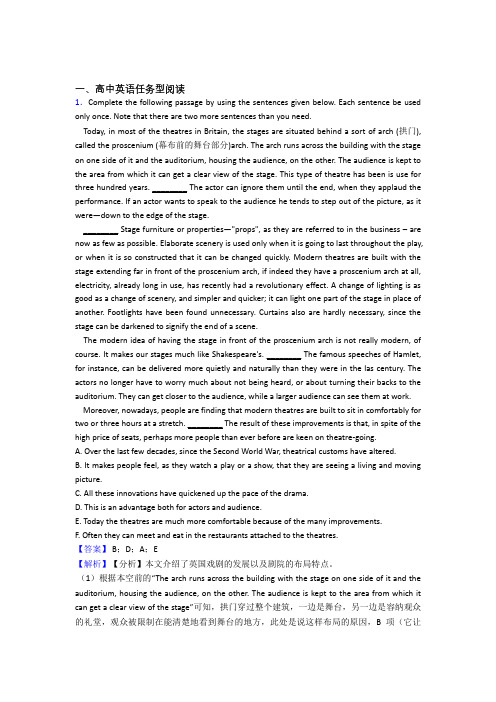
一、高中英语任务型阅读1.Complete the following passage by using the sentences given below. Each sentence be used only once. Note that there are two more sentences than you need.Today, in most of the theatres in Britain, the stages are situated behind a sort of arch (拱门), called the proscenium (幕布前的舞台部分)arch. The arch runs across the building with the stage on one side of it and the auditorium, housing the audience, on the other. The audience is kept to the area from which it can get a clear view of the stage. This type of theatre has been is use for three hundred years. ________ The actor can ignore them until the end, when they applaud the performance. If an actor wants to speak to the audience he tends to step out of the picture, as it were—down to the edge of the stage.________ Stage furniture or properties—"props", as they are referred to in the business – are now as few as possible. Elaborate scenery is used only when it is going to last throughout the play, or when it is so constructed that it can be changed quickly. Modern theatres are built with the stage extending far in front of the proscenium arch, if indeed they have a proscenium arch at all, electricity, already long in use, has recently had a revolutionary effect. A change of lighting is as good as a change of scenery, and simpler and quicker; it can light one part of the stage in place of another. Footlights have been found unnecessary. Curtains also are hardly necessary, since the stage can be darkened to signify the end of a scene.The modern idea of having the stage in front of the proscenium arch is not really modern, of course. It makes our stages much like Shakespeare's. ________ The famous speeches of Hamlet, for instance, can be delivered more quietly and naturally than they were in the las century. The actors no longer have to worry much about not being heard, or about turning their backs to the auditorium. They can get closer to the audience, while a larger audience can see them at work.Moreover, nowadays, people are finding that modern theatres are built to sit in comfortably for two or three hours at a stretch. ________ The result of these improvements is that, in spite of the high price of seats, perhaps more people than ever before are keen on theatre-going.A. Over the last few decades, since the Second World War, theatrical customs have altered.B. It makes people feel, as they watch a play or a show, that they are seeing a living and moving picture.C. All these innovations have quickened up the pace of the drama.D. This is an advantage both for actors and audience.E. Today the theatres are much more comfortable because of the many improvements.F. Often they can meet and eat in the restaurants attached to the theatres.【答案】 B;D;A;E【解析】【分析】本文介绍了英国戏剧的发展以及剧院的布局特点。
高考任务型阅读专题及答案百度文库

实用文档一、高中英语任务型阅读1.任务型阅读I stood at the edge of the cliff. The wind stung my eyes, cutting into my skin. Dark-feathered birds circled the air, swooping (俯冲) low over the ocean every now and then to catch their dinner. Hundreds of feet below, the deep ocean beat against the rough sandy shore. I took a deep breath, filling my lungs with excitement — and at the same time, fear.Behind me, I heard the rest of the crew start to mutter. I was here for the shooting of a movie as I was one of the lead actors in the film Dangerous Things, and this scene was right in the middle of the climax (故事的高潮). It was vital that this went right.The director had talked to me about getting a stunt double (替身演员), but I'd persuaded him that I could handle the dive. I'd taken a diving course a few years ago, and I'd been taking swimming lessons since I was five years old. I had been pretty confident that I could do this — up till now.Someone called out, “Ceria, you don't have to do this! Are you sure you want to dive?” It was one of the producers, Callie Evans. I knew I couldn't turn back now. I couldn't bear to see the disappointed look on the director's face when he was told that I couldn't do it.At that moment, all my fears and worries broke free. The expectation of adventure and victory seemed to move all the hesitation. I swooped downwards. The air on either side of me cut into my extended arms. I knew that this wonderful feeling of flight would only last a few seconds, yet time seemed to slow down so I could hear the thrilled whoops of my crew and a round of applause that seemed to echo in my pounding ears.(1)At the beginning, how did the author feel about what she was going to do?(No more than 3 words)(2)What does the underlined sentence in Paragraph 2 mean in English?(No more than 15 words)(3)Why was the author that confident in diving? (No more than 10 words)(4)What was the crew's reaction while the author was diving down? (No more than 10 words)(5)How do you like the author? Please explain why. (No more than 25 words)【答案】(1)She felt excited and frightened / fearful.(2)It was important that the scene was properly shot.Or: (Because it was the climax of the movie), the dive must perform successfully / well.(3)Because she had taken diving and swimming courses.(4)The crew cheered loudly for her.(5)I think the author was brave and confident, because she could overcome the fear to challenge herself and enjoy success.Or: I think she was brave because she didn't chicken out when facing challenges.【解析】【分析】本文为记叙文。
高考任务型阅读专题及答案百度文库
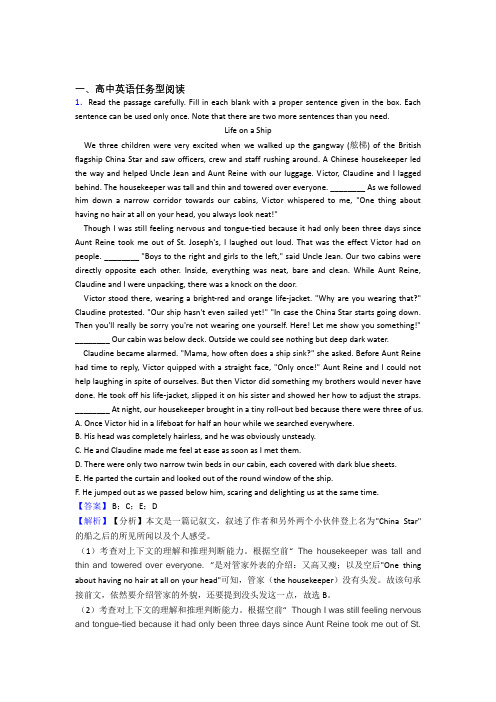
一、高中英语任务型阅读1.Read the passage carefully. Fill in each blank with a proper sentence given in the box. Each sentence can be used only once. Note that there are two more sentences than you need.Life on a ShipWe three children were very excited when we walked up the gangway (舷梯) of the British flagship China Star and saw officers, crew and staff rushing around. A Chinese housekeeper led the way and helped Uncle Jean and Aunt Reine with our luggage. Victor, Claudine and I lagged behind. The housekeeper was tall and thin and towered over everyone. ________ As we followed him down a narrow corridor towards our cabins, Victor whispered to me, "One thing about having no hair at all on your head, you always look neat!"Though I was still feeling nervous and tongue-tied because it had only been three days since Aunt Reine took me out of St. Joseph's, I laughed out loud. That was the effect Victor had on people. ________ "Boys to the right and girls to the left," said Uncle Jean. Our two cabins were directly opposite each other. Inside, everything was neat, bare and clean. While Aunt Reine, Claudine and I were unpacking, there was a knock on the door.Victor stood there, wearing a bright-red and orange life-jacket. "Why are you wearing that?" Claudine protested. "Our ship hasn't even sailed yet!" "In case the China Star starts going down. Then you'll really be sorry you're not wearing one yourself. Here! Let me show you something!" ________ Our cabin was below deck. Outside we could see nothing but deep dark water.Claudine became alarmed. "Mama, how often does a ship sink?" she asked. Before Aunt Reine had time to reply, Victor quipped with a straight face, "Only once!" Aunt Reine and I could not help laughing in spite of ourselves. But then Victor did something my brothers would never have done. He took off his life-jacket, slipped it on his sister and showed her how to adjust the straps. ________ At night, our housekeeper brought in a tiny roll-out bed because there were three of us.A. Once Victor hid in a lifeboat for half an hour while we searched everywhere.B. His head was completely hairless, and he was obviously unsteady.C. He and Claudine made me feel at ease as soon as I met them.D. There were only two narrow twin beds in our cabin, each covered with dark blue sheets.E. He parted the curtain and looked out of the round window of the ship.F. He jumped out as we passed below him, scaring and delighting us at the same time.【答案】 B;C;E;D【解析】【分析】本文是一篇记叙文,叙述了作者和另外两个小伙伴登上名为"China Star"的船之后的所见所闻以及个人感受。
高考英语任务型阅读训练经典题目(及答案)
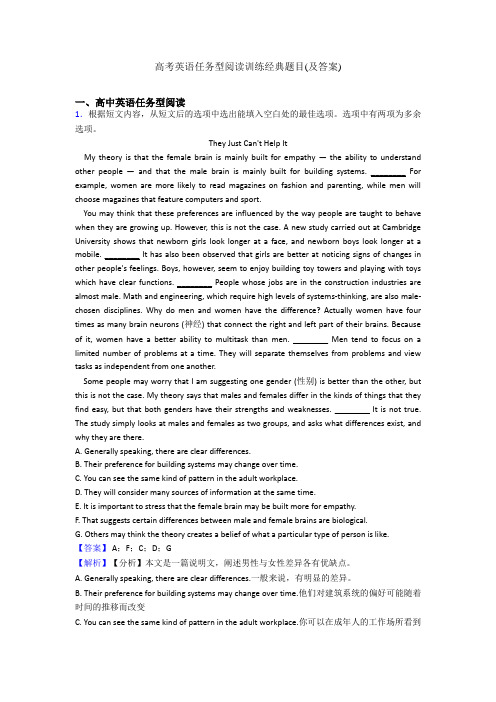
高考英语任务型阅读训练经典题目(及答案)一、高中英语任务型阅读1.根据短文内容,从短文后的选项中选出能填入空白处的最佳选项。
选项中有两项为多余选项。
They Just Can't Help ItMy theory is that the female brain is mainly built for empathy —the ability to understand other people —and that the male brain is mainly built for building systems. ________ For example, women are more likely to read magazines on fashion and parenting, while men will choose magazines that feature computers and sport.You may think that these preferences are influenced by the way people are taught to behave when they are growing up. However, this is not the case. A new study carried out at Cambridge University shows that newborn girls look longer at a face, and newborn boys look longer at a mobile. ________ It has also been observed that girls are better at noticing signs of changes in other people's feelings. Boys, however, seem to enjoy building toy towers and playing with toys which have clear functions. ________ People whose jobs are in the construction industries are almost male. Math and engineering, which require high levels of systems-thinking, are also male-chosen disciplines. Why do men and women have the difference? Actually women have four times as many brain neurons (神经) that connect the right and left part of their brains. Because of it, women have a better ability to multitask than men. ________ Men tend to focus on a limited number of problems at a time. They will separate themselves from problems and view tasks as independent from one another.Some people may worry that I am suggesting one gender (性别) is better than the other, but this is not the case. My theory says that males and females differ in the kinds of things that they find easy, but that both genders have their strengths and weaknesses. ________ It is not true. The study simply looks at males and females as two groups, and asks what differences exist, and why they are there.A. Generally speaking, there are clear differences.B. Their preference for building systems may change over time.C. You can see the same kind of pattern in the adult workplace.D. They will consider many sources of information at the same time.E. It is important to stress that the female brain may be built more for empathy.F. That suggests certain differences between male and female brains are biological.G. Others may think the theory creates a belief of what a particular type of person is like.【答案】 A;F;C;D;G【解析】【分析】本文是一篇说明文,阐述男性与女性差异各有优缺点。
高考英语任务型阅读习题及答案 百度文库

一、高中英语任务型阅读1.任务型阅读Why do some people feel obliged to do the craziest things, while most of us are happy to sit on the sofa and watch their exploits on TV? Robin Styles ponders(考虑)this question.Generally, we love to watch someone's bravery and drama--a single person against the wilds of nature, testing their endurance beyond belief. And our pleasure is greater because we live a comfortable and increasingly risk-free life, where the greatest test of endurance is getting to work through the rush hour. ________However, there are countless ways to test the limits of your endurance, if you should wish to do so, by attempting something unpleasant, uncomfortable or just plain dangerous.American Lynne Cox swims in sub-zero temperatures through the planet's most dangerous oceans wearing only a swimsuit--for fun! According to Lynne, there is always something driving her on. At age 9, when she was swimming in an outdoor pool one day, a violent storm blew up, but she refused to get out of the pool. Something make her carry on. Then she realized that, as the water got colder and rougher, she was actually getting faster and warmer, and she was really enjoying it. At age 14, she broke her first endurance record. Years later, experts discovered that Lynne has a totally even layer of body fat, like a seal. ________The famous British explorer, Sir Ranulph Fiennes, has led many major expeditions (远征) in the extreme cold, including walking right round the Arctic Circle. He has also led expeditions in the extreme heat, and discovered the Lost City of Ubar in the Omani desert. ________Sir Fiennes has said, "If I am getting sick, I find a very powerful way of conquering it is to know that my father would have definitely done it."________There is probably no such thing as a "normal" adventurer. Unsurprisingly, risk-takers tend to be single-minded and unusually determined people who hate the stability and routine that most people prefer. They tend to take risks for the "fun" of it. The excitement becomes addictive, and they want more and more of it. Ordinary life seems boring in comparison.A. She is perfectly made for doing what she does, it seems.B. Adventurers are clearly different from the rest of us.C What she did was really beyond our imagination.D. It seems that many adventurers spend their lives trying to live up to the image of a parent.E. And most of us would prefer it to remain that way.F. Many adventurers have amazed the world with their extraordinary skills.【答案】 E;A;D;B【解析】【分析】本文是一篇说明文,讲述了一些人喜欢以冒险为乐趣。
高考英语任务型阅读试题(及答案)100
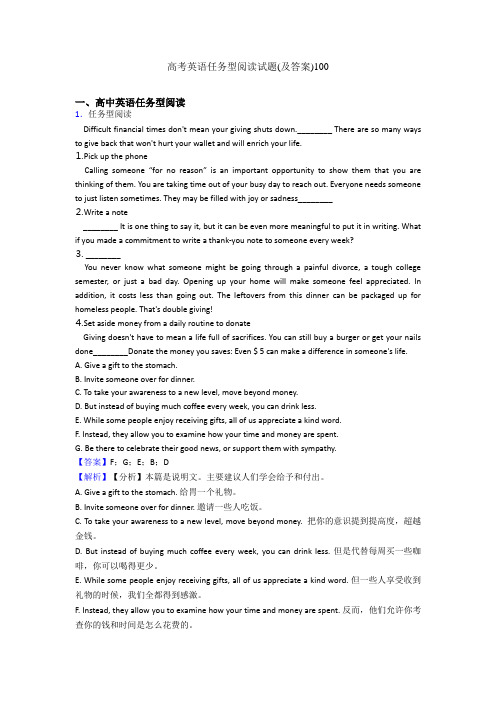
高考英语任务型阅读试题(及答案)100一、高中英语任务型阅读1.任务型阅读Difficult financial times don't mean your giving shuts down.________ There are so many ways to give back that won't hurt your wallet and will enrich your life.⒈Pick up the phoneCalling someone “for no reason” is an important opportunity to show them that you are thinking of them. You are taking time out of your busy day to reach out. Everyone needs someone to just listen sometimes. They may be filled with joy or sadness________⒉Write a note________ It is one thing to say it, but it can be even more meaningful to put it in writing. What if you made a commitment to write a thank-you note to someone every week?⒊ ________You never know what someone might be going through a painful divorce, a tough college semester, or just a bad day. Opening up your home will make someone feel appreciated. In addition, it costs less than going out. The leftovers from this dinner can be packaged up for homeless people. That's double giving!⒋Set aside money from a daily routine to donateGiving doesn't have to mean a life full of sacrifices. You can still buy a burger or get your nails done________Donate the money you saves: Even $ 5 can make a difference in someone's life.A. Give a gift to the stomach.B. Invite someone over for dinner.C. To take your awareness to a new level, move beyond money.D. But instead of buying much coffee every week, you can drink less.E. While some people enjoy receiving gifts, all of us appreciate a kind word.F. Instead, they allow you to examine how your time and money are spent.G. Be there to celebrate their good news, or support them with sympathy.【答案】F;G;E;B;D【解析】【分析】本篇是说明文。
高考英语任务型阅读习题及答案doc

一、高中英语任务型阅读1.任务型阅读Why doesn't the conductor face the audience?________As the only person with his back to the audience, the conductor is a figure who is bathed in the spotlight, but his complex work requires a high degree of musical skill, as well as an ability to extract what he desires out of the group of artists he leads--his orchestra.________A person may become a conductor without graduating from the conducting department of a music school or studying in any kind of conductor's training program. However, becoming the conductor of a famous orchestra requires a great deal more than what is needed merely to join an orchestra.________These naturally examine a conductor's technique and musical interpretation while he conducts an orchestra through a prepared piece of music, but they also involve a sight-reading element________The conductor then has to sit in a room and memorize the piece before coming out and leading the orchestra through the piece by memory. Not only does the conductor have to make his arm and hand motion properly, and signal all the entrances of each instrument, he has to point out intentional mistakes made by the orchestra members on the spot.The least capabilities a conductor must have are: The ability to memorize an entire score. A good ear for distinguishing correct notes among the music of the entire orchestra.________Of the conductors that meet these requirements, those with better musical insight and a higher level of charisma(魅力) will succeed.A. The need for a common musical standard becomes necessaryB. The ability to lead a group of professional musiciansC. There are many conducting competitionsD. For this, the score of music is given to the conductor on siteE. This is how the role of the conductor came to be establishedF. The role of the conductor is in fact not well understoodG. There are no examinations for becoming a conductor【答案】F;G;C;D;B【解析】【分析】为什么指挥不面向观众?本文就这一话题展开介绍了乐队的指挥总是背对着观众的原因,以及成为一名乐队指挥需要哪些方面的能力等。
高考英语任务型阅读试题(及答案)
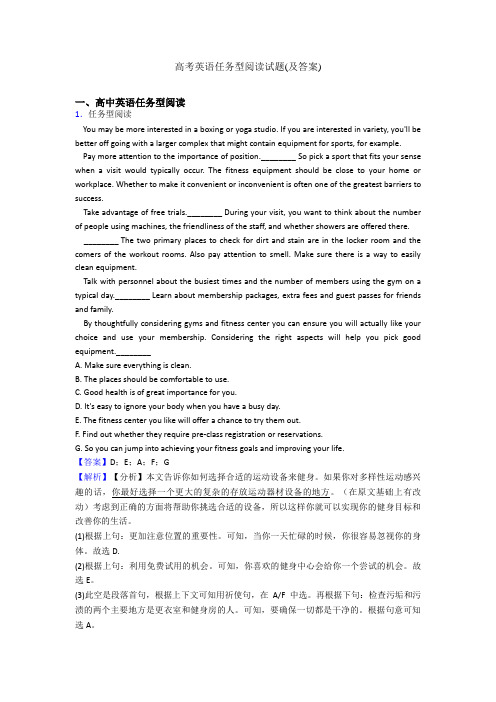
高考英语任务型阅读试题(及答案)一、高中英语任务型阅读1.任务型阅读You may be more interested in a boxing or yoga studio. If you are interested in variety, you'll be better off going with a larger complex that might contain equipment for sports, for example.Pay more attention to the importance of position.________ So pick a sport that fits your sense when a visit would typically occur. The fitness equipment should be close to your home or workplace. Whether to make it convenient or inconvenient is often one of the greatest barriers to success.Take advantage of free trials.________ During your visit, you want to think about the number of people using machines, the friendliness of the staff, and whether showers are offered there.________ The two primary places to check for dirt and stain are in the locker room and the comers of the workout rooms. Also pay attention to smell. Make sure there is a way to easily clean equipment.Talk with personnel about the busiest times and the number of members using the gym on a typical day.________ Learn about membership packages, extra fees and guest passes for friends and family.By thoughtfully considering gyms and fitness center you can ensure you will actually like your choice and use your membership. Considering the right aspects will help you pick good equipment.________A. Make sure everything is clean.B. The places should be comfortable to use.C. Good health is of great importance for you.D. It's easy to ignore your body when you have a busy day.E. The fitness center you like will offer a chance to try them out.F. Find out whether they require pre-class registration or reservations.G. So you can jump into achieving your fitness goals and improving your life.【答案】D;E;A;F;G【解析】【分析】本文告诉你如何选择合适的运动设备来健身。
高考英语任务型阅读习题及答案 百度文库

一、高中英语任务型阅读1.阅读短文,并按照题目要求用英语回答问题。
Yellow Robot deliver snacks to your homeA robot makes its way back to a supermarket after making a delivery during a demonstration in Beijing.Along a street on the outer edges of Beijing, a yellow and black cube about the size of a small washing machine moves leisurely to its destination. This “little yellow horse” is a delivery robot, transporting daily essentials like drinks, fruit and snacks from the local store to the residents. Equipped with GPS system, cameras and radar, the robot is seen by its creator as the future of logistics(物流) in China.“The weak point is that it can't deliver directly to the door like a human.” said one customer, who does not live on the ground floor. “But it is still quite p ractical. The robot delivers relatively quickly.”The robot takes off for Chinese customers' love of cashless payments and smartphone shopping. China is the world's biggest online shopping market with more than half of its population making at least one smartphone purchase per month, according to professional services firm PricewaterhouseCoopers. Whether buying electronics, toilet paper or clothes, Chinese customers are used to simply tapping a button on their smartphone and getting a home delivery.To get a delivery via the “little yellow horse”, customers select the desired products, tap in the address and pay via their phone. Then, the supermarket staff place the items in the robot.Liu Zhiyong, founder and CEO of Zhen Robotics, which manufactures the robot, sees a bright future for his creation. “At the moment, there are 100 million packages delivered every day in China. It will be one billion in the future,” Liu said. “ There will not be enough humans to make the deliveries. We need more and more robots to fill this gap and reduce costs.” These costs are especially high in the last kilometer of a delivery.(1)What is the yellow robot equipped with? (no more than 8 words)(2)What is the weak point of the yellow robot? (no more than 12 words)(3)Why is the robot popular with Chinese people? (no more than 12 words)(4)What does the underlined word “manufactures” mean in the passage? (no more than 1 words)(5)What do you think of the invention of the yellow robot? Why? (no more than 20words) 【答案】(1)GPS system, cameras and radar.(2)It can't deliver directly to the door like a human.(3)Because of Chinese customers' love of cashless payments and smartphone shopping./Because Chinese customers love cashless payments and smartphone shopping.(4)Invents; Creates; Produces;(形式不对减一分)(5)It is very helpful. Because the robot can replace humans to make the delivers and the robot can reduce costs.【解析】【分析】本文是一篇说明文,介绍了黄色的快递机器人以及它的市场前景。
高考英语任务型阅读习题及答案doc

一、高中英语任务型阅读1.任务型阅读Nobody likes to think they are “that guy” at work.________. So, what are some of the rudest things that people do at work — and why shouldn't you do them?Behaving in an unacceptable wayThe most common form of this is eating smelly foods at lunchtime. Other things alike include body smell and its opposite, the wearing of strong perfume, messy desks, or bad breath.________.Checking email on your phone when you're talking to other peopleA recent survey shows that 49 percent of people said their bosses checked their phones while talking with them.________. If you've ever wondered why your team members are unmotivated, this may be why. In fact, when you're talking to someone at work, you should reject any non-important calls.________Do you like the sound of your own voice? Great. Perhaps it's time you learned to like the sound of other people's voices too. If you interrupt others when they speak, they'll dislike you and discount whatever you're saying. And if you routinely take up three quarters of the meeting with your monologues(独角戏), people will turn off and, quite rightly, start checking email on their phones. However, if you listen to what others say and show interest by asking intelligent questions, they'll love you and be likely to give you their support when you speak.Showing off how much you earn________. If you show off your income to someone and then discover you get less than them, you'll look like a fool. If you earn more, they'll feel tired of you. So keep them guessing and hide your earning power in quiet ways — like always paying for the team coffees.A. Talking all the timeB. Being a good listenerC. Team-working can never be ignoredD. All these things will become part of your personal brandE. It's better to be modest when you talk about your incomesF. Bad behavior at work is common — and often we do it without thinkingG. An interesting email is more valuable than the person you are actually talking to【答案】F;D;G;A;E【解析】【分析】本文是一篇说明文,介绍了不受人欢迎的人的几种不良行为。
【备考高考】高考英语任务型阅读试题(附答案)
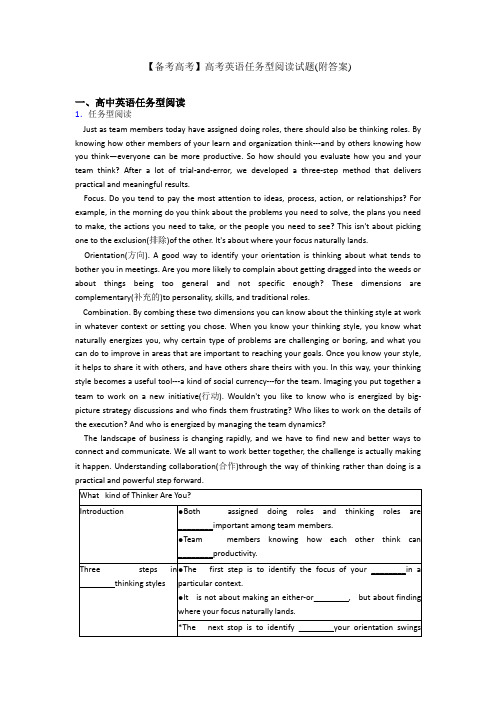
【备考高考】高考英语任务型阅读试题(附答案)一、高中英语任务型阅读1.任务型阅读Just as team members today have assigned doing roles, there should also be thinking roles. By knowing how other members of your learn and organization think---and by others knowing how you think—everyone can be more productive. So how should you evaluate how you and your team think? After a lot of trial-and-error, we developed a three-step method that delivers practical and meaningful results.Focus. Do you tend to pay the most attention to ideas, process, action, or relationships? For example, in the morning do you think about the problems you need to solve, the plans you need to make, the actions you need to take, or the people you need to see? This isn't about picking one to the exclusion(排除)of the other. It's about where your focus naturally lands.Orientation(方向). A good way to identify your orientation is thinking about what tends to bother you in meetings. Are you more likely to complain about getting dragged into the weeds or about things being too general and not specific enough? These dimensions are complementary(补充的)to personality, skills, and traditional roles.Combination. By combing these two dimensions you can know about the thinking style at work in whatever context or setting you chose. When you know your thinking style, you know what naturally energizes you, why certain type of problems are challenging or boring, and what you can do to improve in areas that are important to reaching your goals. Once you know your style, it helps to share it with others, and have others share theirs with you. In this way, your thinking style becomes a useful tool---a kind of social currency---for the team. Imaging you put together a team to work on a new initiative(行动). Wouldn't you like to know who is energized by big-picture strategy discussions and who finds them frustrating? Who likes to work on the details of the execution? And who is energized by managing the team dynamics?The landscape of business is changing rapidly, and we have to find new and better ways to connect and communicate. We all want to work better together, the challenge is actually making it happen. Understanding collaboration(合作)through the way of thinking rather than doing is a practical and powerful step forward.【答案】equally;improve/increase;evaluating;thinking;choice;whether;combine;contributes/leads;Conclusion;how【解析】【分析】本文是一篇说明文,正如今天的团队成员分配的角色一样,也应该有思考的角色,两者同样重要。
最新高考英语任务型阅读试题(含答案)(1).doc
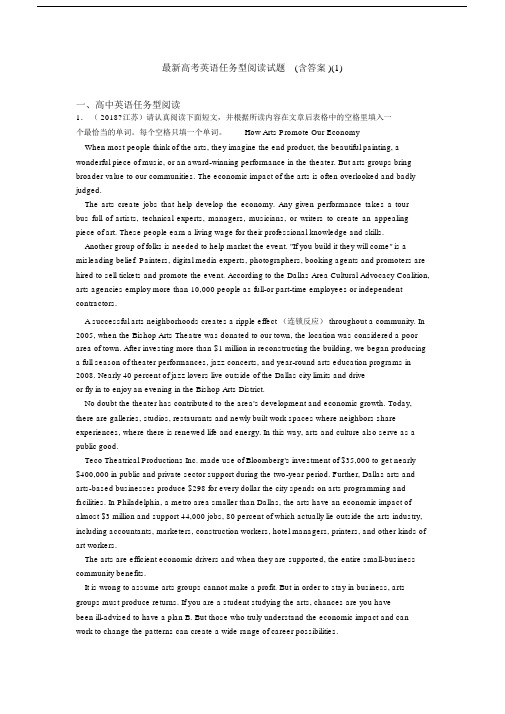
最新高考英语任务型阅读试题(含答案 )(1)一、高中英语任务型阅读1.( 2018?江苏)请认真阅读下面短文,并根据所读内容在文章后表格中的空格里填入一个最恰当的单词。
每个空格只填一个单词。
How Arts Promote Our Economy When most people think of the arts, they imagine the end product, the beautiful painting, a wonderful piece of music, or an award-winning performance in the theater. But arts groups bring broader value to our communities. The economic impact of the arts is often overlooked and badly judged.The arts create jobs that help develop the economy. Any given performance takes a tourbus full of artists, technical experts, managers, musicians, or writers to create an appealing piece of art. These people earn a living wage for their professional knowledge and skills.Another group of folks is needed to help market the event. "If you build it they will come" is a misleading belief. Painters, digital media experts, photographers, booking agents and promoters are hired to sell tickets and promote the event. According to the Dallas Area Cultural Advocacy Coalition, arts agencies employ more than 10,000 people as full-or part-time employees or independent contractors.A successful arts neighborhoods creates a ripple effect (连锁反应) throughout a community. In 2005, when the Bishop Arts Theatre was donated to our town, the location was considered a poor area of town. After investing more than $1 million in reconstructing the building, we began producing a full season of theater performances, jazz concerts, and year-round arts education programs in 2008. Nearly 40 percent of jazz lovers live outside of the Dallas city limits and driveor fly in to enjoy an evening in the Bishop Arts District.No doubt the theater has contributed to the area's development and economic growth. Today, there are galleries, studios, restaurants and newly built work spaces where neighbors share experiences, where there is renewed life and energy. In this way, arts and culture also serve as a public good.Teco Theatrical Productions Inc. made use of Bloomberg's investment of $35,000 to get nearly $400,000 in public and private sector support during the two-year period. Further, Dallas arts and arts-based businesses produce $298 for every dollar the city spends on arts programming and facilities. In Philadelphia, a metro area smaller than Dallas, the arts have an economic impact of almost $3 million and support 44,000 jobs, 80 percent of which actually lie outside the arts industry, including accountants, marketers, construction workers, hotel managers, printers, and other kinds of art workers.The arts are efficient economic drivers and when they are supported, the entire small-business community benefits.It is wrong to assume arts groups cannot make a profit. But in order to stay in business, arts groups must produce returns. If you are a student studying the arts, chances are you havebeen ill-advised to have a plan B. But those who truly understand the economic impact and canwork to change the patterns can create a wide range of career possibilities.Arts as an economic Our communities________ from arts in terms of economy.driver________of arts' Arts activity demands a(n) ________ effort. It involves creation,promoting our economy performance, and ________.★Artists make a living through their creative work.★Others get paid by marketing the event.other industries whether they lie inside or outside arts.★Besides tickets, some jazz lovers will pay their ________ to andfrom the events.★Arts contribute to cultural development when people gather togetherto share their experience and renew their energy.results.★TeCo used a $35,000 art investment to attract an overall support of$400,000.★ In Dallas, one dollar invested in arts could harvest and extraordinaryreturn of nearly $300.★ In Philadelphia the arts have created about 35,000jobopportunities for workers ________ arts industry.Art students making a With these ________ in mind, art students need not worry aboutgood living their career and have a(n) ________ plan.【答案】benefit ; Ways; joint/collective ; promotion/marketing;effect;fares;positive;outside/beyond ; statistics/data/analyses ; alternative【解析】【分析】本文论述如何用艺术促进经济。
高考英语任务型阅读习题及答案doc

一、高中英语任务型阅读1.Read the passage carefully. Fill in each blank with a proper sentence given in the box. Each sentence can be used only once. Note that there are two more sentences than you need.Life is not easy when you are looking for something worthwhile and ready to learn from the best experiences. ________ Here are some life lessons which people will learn the hard way in majority of cases.________However people usually get discouraged when it takes more time than they thought it would. At this time, people refer only to people who have already achieved what they want to do. Look at any successful person and you'll notice one thing common in all of them: they took time to learn and mastered their skill like no one else. There is no elevator to success and you have to take the stairs.Be brave to take the road less traveled. In our whole life, we always want to follow the same path that everyone suggests, do the same thing everyone does, take the same career path everyone takes, wear the same clothes everyone wears, and hang out with the same people we work with. Why? Because we are scared to fail. But when you get bored of life, you realize that you are not meant to do what everyone does and that your destiny is different from anyone else's out there in the world. ________You don't have to live your life in a way society wants you to. ________Parents sometimes force their children to select a career they don't want because other children have selected that career. Worst of all, people follow them without even asking. There is no harm in believing in old beliefs but when you pursue them before your interest, sooner or later you'll realize that you should first do what you think is right.A. It takes continuous time and effort to be successful in any area.B. The general rule goes that the harder you try, the greater results you get.C. Many old beliefs are being performed these days and are followed blindly.D. It always takes tests and then fails us to learn anything worthwhile.E. However, in most circumstances your effort and attempt go well alongside with your desired achievement.F. But the price we pay to realize this is high because it takes a great amount of courage to follow your own path.【答案】 D;A;F;C【解析】【分析】本文是一篇说明文,介绍了几个人生教训。
高考英语任务型阅读训练经典题目(附答案)50
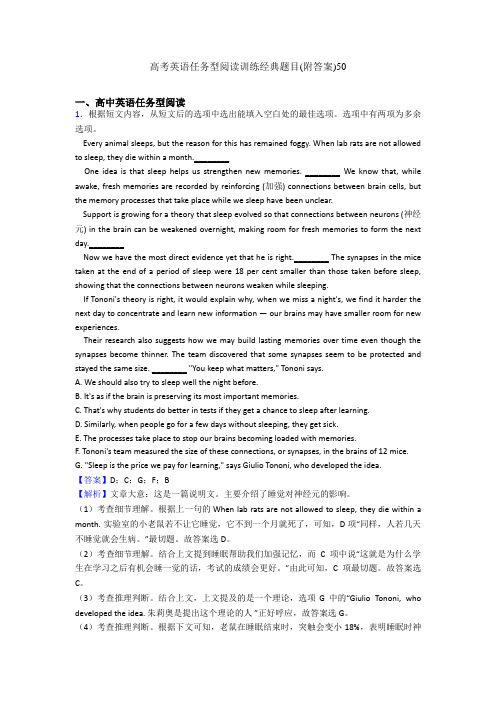
高考英语任务型阅读训练经典题目(附答案)50一、高中英语任务型阅读1.根据短文内容,从短文后的选项中选出能填入空白处的最佳选项。
选项中有两项为多余选项。
Every animal sleeps, but the reason for this has remained foggy. When lab rats are not allowed to sleep, they die within a month.________One idea is that sleep helps us strengthen new memories. ________ We know that, while awake, fresh memories are recorded by reinforcing (加强) connections between brain cells, but the memory processes that take place while we sleep have been unclear.Support is growing for a theory that sleep evolved so that connections between neurons (神经元) in the brain can be weakened overnight, making room for fresh memories to form the next day.________Now we have the most direct evidence yet that he is right.________ The synapses in the mice taken at the end of a period of sleep were 18 per cent smaller than those taken before sleep, showing that the connections between neurons weaken while sleeping.If Tononi's theory is right, it would explain why, when we miss a night's, we find it harder the next day to concentrate and learn new information — our brains may have smaller room for new experiences.Their research also suggests how we may build lasting memories over time even though the synapses become thinner. The team discovered that some synapses seem to be protected and stayed the same size. ________ "You keep what matters," Tononi says.A. We should also try to sleep well the night before.B. It's as if the brain is preserving its most important memories.C. That's why students do better in tests if they get a chance to sleep after learning.D. Similarly, when people go for a few days without sleeping, they get sick.E. The processes take place to stop our brains becoming loaded with memories.F. Tononi's team measured the size of these connections, or synapses, in the brains of 12 mice.G. "Sleep is the price we pay for learning," says Giulio Tononi, who developed the idea.【答案】D;C;G;F;B【解析】文章大意:这是一篇说明文。
- 1、下载文档前请自行甄别文档内容的完整性,平台不提供额外的编辑、内容补充、找答案等附加服务。
- 2、"仅部分预览"的文档,不可在线预览部分如存在完整性等问题,可反馈申请退款(可完整预览的文档不适用该条件!)。
- 3、如文档侵犯您的权益,请联系客服反馈,我们会尽快为您处理(人工客服工作时间:9:00-18:30)。
一、高中英语任务型阅读1.请认真阅读下列短文,并根据所读内容在文章后表格中的空格里填入一个最恰当的单词。
Decoding the young brainThere was a funny experiment to see how a young child would answer a specific question compared to an adult. After the adult had spent some time speaking with the child, he asked the child, “What do you think about me?” The child answered, “You talk too much.” When the adult performed the same experiment with another adult, the reply to the same question was, “I think you're a very interesting person.” Even if the adult f elt the same way as the child, his brain allowed him to take a moment,consider the question, and come up with an answer. He could have been annoyed, but his answer didn't reflect it because he was being polite.The secret lies in the science of the developing brain. The child's honest answer was reflected in the fact that his brain wasn't equipped to filter(过滤) information before answering the question. As a result, he was honest, but he said something that may have been hurtful. However, the child did not intentionally hurt the adult; it's just the way his brain works. As a child grows into adolescence and then into adulthood, that changes.The human brain is made up of billions of neurons(神经元). In order for our body to execute a command, like getting up from a chair and walking to the other room, the neurons in the brain have to communicate with each other. They also help us employ our senses like taste and touch and help us remember things.When the neurons send messages, perhaps one sensation(感觉) the person feels is excitement about eating a cookie because it is so delicious. Later, if that person smells a cookie or hears someone talking about a cookie, it can spark the electrical signals that call up the memory of eating the delicious cookie. In an adult, he or she may remember that eating too many cookies can have consequences, like weight gain. But because the younger brain is more impulsive(冲动的), the desire to feel the pleasure of the sweet treat outweighs the consequences.That is becau se when a child is young, his brain is “wired” in such a way that he seeks pleasure and is more willing to take risks than an adult. This affects his decision-making process and it is why younger people tend to be more impulsive. Sometimes parents have to tell their children over and over again before the child remembers that something is dangerous or risky. How many times have we heard a parent say, “I tell her this all the time, but she never listens!”To conclude, what we know about the young brain is that children are more likely than adults to be impulsive. It isn't always necessarily because they are being naughty; it may very well be because of their brains. So the next time you ask a child what he really thinks of you, be prepared for any kind of answer.dangerous;stronger/greater;necessarily【解析】【分析】本文是一篇说明文,说明了小孩子说一些伤人的、冒犯性的语言并不是故意为之,而是因为儿童的大脑还没有发育完全,不具备在回答问题前过滤信息的功能导致的。
(1)考查信息归纳的能力。
根据第一段“‘What do you think about me?’ The child answered, ‘You talk too much.’”可知,对于提出的问题,孩子的回答总是答非所问,脱离话题。
故填off“脱离;离开”。
(2)考查信息归纳的能力。
根据第一段中的“his brain allowed him to take a moment,consider the question, and come up with an answer”可知孩子得出答案前总是会考虑再三。
且实验已经发生在过去,故填一般过去时thought。
(3)考查信息归纳的能力。
第一段通过实验引出后文中分析造成这种现象的原因,故填phenomenon。
(4)考查信息归纳的能力。
根据第二段“As a result, he was honest, but he said something that may have been hurtful. However, the child did not intentionally hurt the adult;”可知虽然孩子会说一些伤人的话,但是他们并不是有意的。
故第四题填连词although/though“虽然;尽管”。
(5)考查信息归纳的能力。
根据第三段中的“The human brain is made up of billions ofneurons”可知数十亿的神经元组成了人类的大脑。
本句已经存在非谓语动词have,故make 做非谓语与逻辑主语构成主谓关系,故填making。
(6)考查信息归纳的能力。
根据第三段中的“They also help us employ our senses like taste and touch and help us re member things.”可知神经元通过味觉或者触觉帮助我们记住事物,故一个人可能会把饼干的味道和吃饼干的记忆联系起来。
故填associate。
(7)考查信息归纳的能力。
根据第五段中的“That is because when a child is young, his brain is ‘wired’ in such a way that he seeks pleasure and is more willing to take risks than an adult.”孩子的大脑就会以一种“连线”的方式来寻找快乐,并且比成年人更愿意冒险。
故可知一个年幼的孩子有一种寻求快乐和冒险的自然倾向,这是由他幼小的大脑决定的。
故填tendency“倾向;趋势”。
(8)考查信息归纳的能力。
根据第五段“Sometimes parents have to tell their children over and over again before the child remembers that something is dangerous or risky. How many times have we hea rd a parent say, “I tell her this all the time, but she never listens!”可知即使父母警告过多次,孩子还是会去尝试危险和冒险的食物。
故填dangerous。
(9)考查信息归纳的能力。
根据最后一段中的“what we know about the young brain is that children are more likely than adults to be impulsive.”可知成年人比小孩子控制冲动的能力更强、更好。
